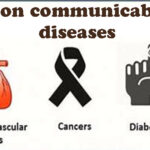Poor Diet: The Biggest Global Killer. Top five risk factors for death globally are firstly, dietary risks; followed in the second place by High Blood Pressure; thirdly tobacco; fourth high blood sugar and fifth air pollution. Global Burden of Disease Study (GBD) unveils worldwide impact of diet on health. More than 1.1 crore deaths due to poor diet alone
A study has convincingly and empirically established beyond all doubt that poor diet poses the greatest risk to life amongst all factors affecting global populations that impact health and cause death. In fact, it is now empirically proven that healthier diets could, in fact, save one in five lives every year. These impactful findings have been shared by the ‘Institute of Health Metrics and Evaluation’ (IHME), University of Washington, USA and are based on information contained in the study, “Health effects of dietary risks in 195 countries, 1990–2017: a systematic analysis for the Global Burden of Disease Study,” which is the most comprehensive global study of the health impact of diet. Published in The Lancet, the study is based on more than 9,000 country years of data.
According to the study carried out worldwide, poor diet was linked to not less than 1.1 crore deaths. A staggering figure when seen in context of what the enabling causes of demise were. Among those deaths 95 lakh deaths were from cardiovascular disease; 9,13,090 deaths from cancer; and 3,38,714 deaths from diabetes. Equally disconcerting and eye-opening is the finding that as many as 25.5 crore disability-adjusted life years (DALYs), a measure of overall disease burden, expressed as the number of years lost due to ill-health, disability or early death, were attributable to dietary risk factors.
There are eye-opening findings of the Lancet study which merit consideration and reflection by not only caregivers but also by governments and policy planners globally. For instance, the data-points clearly indicate that that “suboptimal diet is responsible for more deaths than any other risks globally, including tobacco smoking, highlighting the urgent need for improving human diet across nations.” The researchers further add that “…although sodium, sugar, and fat have been the main focus of diet policy debate in the past two decades, our assessment shows that the leading dietary risk factors for mortality are diets high in sodium, low in whole grains, low in fruit, low in nuts and seeds, low in vegetables, and low in omega-3 fatty acids; each accounting for more than 2 percent of global deaths.”
In the study, the top 10 risk factors for death globally were cited as firstly, dietary risks, followed in the second place by high BP, and thirdly tobacco. High blood sugar, and air pollution, and high BMI were the next three causes. Cholesterol (High LDL), malnutrition, Alcohol, and impaired kidney function complete the risk factors listing. The study has underlined the fact that the largest number of diet-related deaths were associated with a few key food factors—15, to be precise. As a matter of concern, and something that should prove instructive for dieticians and the general public, across all 15 dietary factors, more deaths were associated with not eating enough healthy foods compared with eating too many unhealthy foods.
The study evaluated the consumption of major foods and nutrients across 195 countries and quantified the impact of poor diets on death and disease from non-communicable diseases (specifically cancers, cardiovascular diseases, and diabetes).The study also evaluated the consumption of major foods and nutrients across 195 countries and quantified the impact of poor diets on death and disease from non-communicable diseases (specifically cancers, cardiovascular diseases, and diabetes). It tracked trends for close to two decades. The study looked at 15 dietary elements – diets low in fruits, vegetables, legumes, whole grains, nuts and seeds, milk, fibre, calcium, seafood omega-3 fatty acids, polyunsaturated fats, and diets high in red meat, processed meat, sugar-sweetened beverages, trans fatty acids, and sodium. The study was funded by Bill & Melinda Gates Foundation. It was conducted by researchers from the GBD 2017 Diet Collaborators
Study Links: http://www.thelancet.com/journals/lancet/article/PIIS0140-6736(19)30041-8/fulltext











